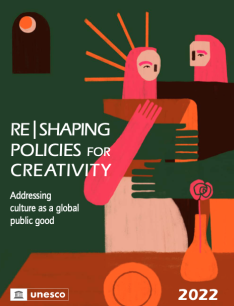Re|shaping policies for creativity

Culture and creativity account for 3.1% of global Gross Domestic Product (GDP) and 6.2% of all employment. Besides being one of the world's youngest and fastest-growing economic sectors, new and ongoing challenges also make the creative economy one of the most vulnerable sectors that is often overlooked by the public and private investment.
The cultural and creative sectors were among the hardest hit by the pandemic, with over 10 million jobs lost in 2020 alone. Public investment in culture has been declining over the last decade and creative professions remain overall unstable and underregulated. Although culture and entertainment are major employers of women (48.1%), gender equality is a distant prospect. Additionally, only 13% of voluntary national reviews of progress towards the 2030 Agenda acknowledge culture’s contribution to sustainable development. Disparities between developed and developing countries are significant, with developed countries leading the trade of cultural goods and services – accounting for 95% of total of all employment exports of cultural services.
The COVID-19 pandemic is a reminder that no country alone can forge the protection and promotion of diversity within its territory and beyond. Culture’s value as a global public good must be cherished and preserved for the benefit of present and future generations.
Re|Shaping Policies for Creativity – Addressing culture as a global public good offers insightful new data that shed light on emerging trends at a global level, as well as putting forward policy recommendations to foster creative ecosystems that contribute to a sustainable world by 2030 and beyond.